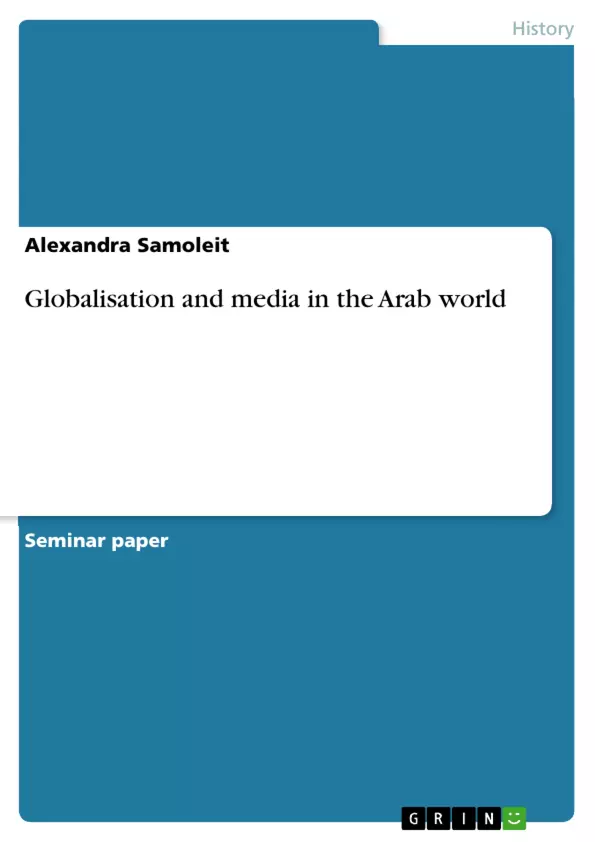The focus of this paper is the media system of the Arab world, its development, and the local and global factors that have had considerable influence during the last years. Different theories question the importance of communication and media for globalisation and vice versa, therefore the existence of a global communication network or global media and the participation of the Arab world in the global media evolution is observed. In the last fifty years print media, television, and internet have proven to be important agents of social change even if their development has always been accompanied by censorship arrangements in the different political systems of the region.
The Arab world has not been isolated from global changes in the media sector. Mass media, especially the Internet, and their importance for global economy are seen as motor of globalization but capital and technology are expanding faster than the development of trans-cultural communication is able to. This displacement in the action-reaction chain can be observed in the way global content and media are domesticised, transformed, controlled and rejected in the Arab countries and how important topics like cultural imperialism, indigenous values, international norms of journalism, and freedom of speech are discussed and negotiated in these societies.
Inhaltsverzeichnis (Table of Contents)
- Introduction
- Theoretical basis- Globalisation and Media
- Global communication system
- Development of Media in the Arab World
- Print Media
- Television
- Satellite Television
- Internet
- Internet in the Arab World
- Censorship
- Global Influence on Media and Society
- Problems in the Arab Society
- Media Development models in the Arab World
- Responses to the challenge of Globalisation
- Summary
Zielsetzung und Themenschwerpunkte (Objectives and Key Themes)
This paper examines the media system of the Arab world, its development, and the local and global factors influencing it. It explores different theories regarding the importance of communication and media for globalization, including the existence of a global communication network or global media. The paper analyzes the evolution of mass media in Arab countries, focusing on print media, television, and the Internet, and discusses censorship arrangements related to these media.
- The role of communication and media in globalization
- The development of mass media in the Arab world
- The influence of global changes on Arab media systems
- Censorship and its impact on media in the Arab world
- The challenges and opportunities of globalization for Arab societies
Zusammenfassung der Kapitel (Chapter Summaries)
- Introduction: This chapter introduces the topic of globalization and media in the Arab world, outlining the paper's objectives and scope. It emphasizes the need to understand the evolving media landscape in the region, considering both local and global influences.
- Theoretical basis- Globalisation and Media: This chapter delves into different theoretical perspectives on the relationship between globalization and communication. It explores contrasting views on the positive and negative impacts of global communication, with a particular focus on the role of mass media and the Internet.
- Global communication system: This chapter examines the characteristics of a global communication system, discussing the challenges in defining and establishing such a system. It addresses issues related to the reception of international programs, the influence of Western news agencies, and the potential for a global media landscape.
Schlüsselwörter (Keywords)
Globalization, Arab World, media, communication, global communication network, cultural imperialism, mass media, print media, television, satellite television, Internet, censorship, social change, political influence, media development models.
Frequently Asked Questions
How has globalization influenced media in the Arab world?
Globalization has introduced new technologies like satellite TV and the Internet, which have challenged traditional state-controlled media and censorship, acting as motors for social change.
What is the role of the Internet in Arab societies?
The Internet serves as a platform for trans-cultural communication and economic growth, but it also creates a tension between global content and indigenous values or local censorship.
Does censorship still exist in the Arab media system?
Yes, despite the rise of global media, various political systems in the region still employ censorship arrangements to control information, though these are increasingly bypassed by digital platforms.
What is cultural imperialism in the context of Arab media?
It refers to the concern that Western media content and international journalism norms might overwhelm local cultures and traditional Arab values.
How do Arab countries respond to the challenges of globalization?
Responses vary from domesticating and transforming global content to outright rejection or increased state control, while negotiating freedom of speech within their societies.
- Quote paper
- Alexandra Samoleit (Author), 2005, Globalisation and media in the Arab world, Munich, GRIN Verlag, https://www.grin.com/document/53286



